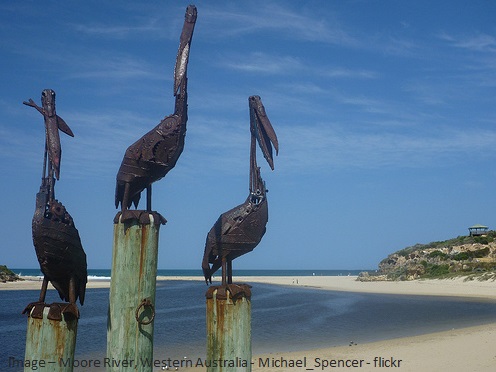
My decision to take a Medical Rural Bonded Scholarship (MRBS)
Update – on 12th May 2015 when the Federal Budget was handed down the government announced that the Medical Rural Bonded Scholarship program was closed to new entrants. At that time there were over 1,300 participants continuing in the scheme. Click here for details of the announcement.
Following is the original article as it was posted on 5/9/2013.
My Health Career is grateful to Western Australian based medical practitioner Penny Wilson for allowing us to re-publish her blog post orginally titled “On Being Bonded.” It provides an insight into what a decision to take a Medical Rural Bonded Scholarship can mean more than 10 years down the track. You can follow Penny on Twitter: @nomadicGP and check out her blog nomadicgp.
“My name is Penny Wilson and I am a bonded doctor under the Medical Rural Bonded Scholarship Scheme. It’s a topic that it still considered somewhat of a taboo and although opinions on its fairness and effectiveness abound, no one seems to talk about what it is like for those who are bonded. So here I present my story which I hope is of interest to others.
Background to the MRBS
The MRBS is a federal government initiative which took its first cohort in 2001 with one hundred medical students from across Australia having been enrolled each year. The deal: a payment of $20,000 per year of medical school (indexed annually, now over $25,000) in return for working in a rural area for six years after achieving fellowship, minus any scaling discounts. The penalties for changing your mind are considerable. If you pull out of the scheme during med school you lose your university place and aren’t permitted to re-apply to study medicine for a further 5 years. If you pull out after graduation you are required to repay the money with interest and you lose your access to a Medicare provider number for 12 years – essentially preventing you from earning a living through clinical medicine. (NB: This is different to the Bonded Medical Places scheme which started in 2004.)
It has been described as “exploitative” by AMSA in their policy document and the AMA guide for prospective medical students also encourages candidates to carefully consider if “there are other options that would suit you better, other than accepting a bonded place.” A 2011 review of rural workforce policies projects that rural bonding programs will have a significant positive impact on clinician numbers in rural and remote areas and improve access to health care over the coming years. So is it the answer to our country’s rural workforce woes? The first group of bonded doctors have just been starting to trickle through fellowship in the last couple of years so the real impact on rural communities has yet to be seen.
The beginning…
In December 2000, just weeks after year 12 exams, I was anxiously waiting to find out if I had been accepted into medicine at UWA. The day before university offers were due to be released I was surprised with a phone call from the Faculty of Medicine and Dentistry telling me that not only had I been offered a place in medicine, but that I had also been offered a MRBS. It was made quite clear to me that regardless of my decision regarding the MRBS, my entrance scores were high and so a place in medicine was guaranteed. You can imagine how overjoyed and overwhelmed I was with the news that not only had I achieved my dream of landing a place in med, but also had this offer of a substantial scholarship to help me on my way. For someone straight out of high school that sum of money seemed enormous, particularly as I was earning $7 per hour at Hungry Jack’s at the time!
After some careful discussion with my family I decided to take the scholarship, based on the fact that (a) my family wasn’t in a position to support me through university so it would have been a struggle financially, (b) I had enjoyed occasional family holidays to “the country” so figured I living out there someday would be quite fun, and (c) I liked the idea of providing a valuable contribution to a community. I was only 17 at the time and making a decision that would affect me for at least another 17 years into the future. It is easy to see in retrospect how naive I was. I had this wildly romantic idea of what it was like to be a country GP and had a teenager’s optimism that everything else in my life would have worked itself out perfectly by then. Admittedly, at 17, my favourite band was Savage Garden, my dream car was a mazda 121, my best friend wanted to be a mermaid and I wanted nothing more than to marry Brett Lee and live in a castle. It’s no wonder that I really had no concept of the reality of rural practice, knew nothing about Medicare, provider numbers, fellowships and training options and couldn’t have imagined what a major influence this decision would have over every aspect of my life.
Sweet and innocent me at 17. Awww….
In the early days of uni, I felt that there was a fair bit of stigma about being bonded, particularly as we were the very first year group which had it. No one really felt comfortable admitting that they were bonded and I would often find myself in the awkward situation where other students were talking about it in a negative way and I kept quiet in an attempt to fly under the radar. I think a lot of people had the (erroneous) belief that we only took the scholarship to secure a place in med and maybe for that reason we were considered second class students. Or perhaps they just thought we were crazy to agree to it.
Things got a bit better in 4th year when the Bonded Support Program started through ACRRM. It put on networking functions for bonded students, sponsored attendance at conferences, provided access to ACRRM’s online learning platform and generally helped me to feel less isolated. I was lucky enough to be supported to attend three conferences through the program which I found really valuable for making connections with others and gaining more personal confidence. Unfortunately the BSP program is aimed at medical students and junior doctors and any support completely disappeared during the registrar training and post-fellowship years. I suspect that this may be partly due to the fact that it is being run through a college (ACRRM) so if you decide to train through another college (eg RACGP or presumably any specialty college) then you are banished from the community and lose any access to support resources. I’m not sure if this was the case for others, but it was certainly how it seemed to me.
Effect on training
Having the scholarship certainly did affect some of the choices that I made during my training. As a medical student I took a John Flynn Placement, spent my 5th year in Kalgoorlie at the Rural Clinical School and took an intern rotation in Port Hedland. These were fantastic experiences and I’m glad that I did them as I had a great time and they certainly boosted my enthusiasm for rural practice.
Embracing the Pilbara lifestyle, 2007
As a student I discovered a passion for both general practice and O&G and was lucky enough to be able to pursue a career combining them both by training towards GP obstetrics. I could have used the obstetrics as an Advanced Rural Skills Post for FARGP or ACRRM and in fact that would have been the most sensible course of action, given my future career as a rural doctor. But a funny thing happens psychologically when you know you have this bond stretching out for years and years ahead of you; you try to minimise its impact on your life as much as possible. So as city girl knowing that I HAD to move to the country at some stage, I decided to stay put in the city for as long as I was free to do so. I also wanted to get my fellowship completed as soon as possible so I could get the damn bond service over and done with and get my freedom back. That meant getting going down the RACGP general pathway and being finished after only 18 months of further GP training, all of which was done in the Perth metro area.
Love my job as a GP obstetrician
Preparedness for rural practice
The upshot of all of those training decisions is that now I am a fellow of the RACGP with an advanced DRANZCOG. A fully fledged GP obstetrician, in fact. And I am discovering now that I am woefully unprepared for rural practice. I have really very little idea as to where I want to work and what kind of job I want so I’m trying to get a better idea by starting off as a locum (read more about my plan here). Unfortunately I am discovering that I actually don’t have the skills required for a lot of the jobs that I am looking for. Basically, it is not all that common in WA that a GP obstetrician just does GP and obstetrics. Mostly the jobs involve inpatient and emergency work, often as the sole doctor on duty. I haven’t worked in an ED since I was a resident 4 years ago and have never intubated anyone older than 5 minutes of age, managed a major trauma, inserted a chest drain, thrombolysed a STEMI, palliated a cancer patient, managed renal dialysis or any number of other things that independent rural generalists could be expected to do. I can count the number of successful LPs I’ve done on one hand. I also have little or no recent experience with Aboriginal Health, which is obviously a big part of rural practices in many areas. At the moment I feel a bit stuck between a rock and a hard place in wanting to use my obstetric skills but not feeling quite ready to plunge into the complete spectrum of rural generalism without any supervision. I can’t help but feel some regret that I didn’t prepare myself better during my registrar training, but at the same time, I’m glad that after so many years of anticipation I can finally get on with starting to pay back my bond time.
Personal considerations
From my perspective, the biggest issue is the potential impact on my personal life. I guess I assumed that by the time it came to starting my return of service obligations that I’d be married and have my family life all sorted out. Every boyfriend that I have had since starting uni has been (consciously or otherwise) screened for rural suitability, and every relationship has included a discussion along the lines of “If we end up together in the long term, you will have to sacrifice your freedom to come with me to the country just because you had the misfortune of falling in love with me.” I happened to be in a long-term relationship during my GP training and my partner’s successful Perth-based career was a major factor in why I stayed in the city during my training. As my training came to an end we agonised over where we could live that would both fulfil my bond requirements and allow him to keep working in his chosen field. We really struggled to find any solution which wouldn’t make one or both of us completely miserable.
As it turned out, that relationship came to its natural end anyway, so at least now I don’t have to suffer the guilt of dragging an unwilling partner with me to the bush for a decision I made 13 years ago. But, while I hate to fall into a stereotype, as a single woman approaching the age of 30 who is keen for a family, I can’t help feeling a bit nervous that my options for finding a partner will be restricted to the 30% of the population who live outside of major cities. The parental pressure to produce grandchildren has begun and although I gather that there are plenty of eligible blokes in country towns, it’s still a cause of some anxiety. Maybe a reality TV show for medics along the lines of “Doctor Wants a Wife/Husband” would be a better recruitment and retention strategy for rural health services!
Suggestions for change
Here are my thoughts about how experience of MRBS scholars could be improved:
- 17 year olds should not be allowed to sign up to the MRBS. Undergraduate students should be eligible only after completing one or two years of undergraduate study when they have had a chance to experience life as an adult and are a bit more informed about what a career in medicine involves.
- Specific support should be offered to more senior bonded doctors in the registrar training and early post-fellowship years. Eg, networking with peers at the same career stage, formal mentoring from experienced rural doctors, access to rural skills training, access to psychological support etc
- Registrar training should count (at least in part) towards the return of service period. This would give doctors an incentive to train in the sort of area they will ultimately end up working in and allow them to gain appropriate rural skills while still having access to supervision.
- The penalty for breaching the bond should not include such harsh provider number restrictions. If someone’s life or family circumstances are such that they really are better off staying in a major city then they should be able to repay the scholarship amount and still be able to make a living from clinical work.
- There should be more flexibility in the return of service period. For example:
- Bonded doctors are required to work rurally for an average of 20 hours per week for at least 9 months each year but are not allowed to work in a major city during the rest of the time. Allowing doctors to do some work in a major centre could allow them to maintain or gain new skills and perhaps stay more up to date with clinical practice (for instance by working in a teaching hospital) which would be of benefit the rural communities they service.
- Bonded doctors do not have to commence working in a rural area until 12 months after fellowship, but are forbidden to work in a major city immediately after attaining their fellowship. This makes no sense. If people are working in a city when they get their fellowship, it’s better to let them finish up their final employment contract and get their life sorted out in that 12 months before having to start the return of service.
Final thoughts
Overall, I have been very grateful to have had the MRBS as it allowed me to concentrate on my studies during med school instead of working, come out of university in a stable financial position and to travel to some interesting conferences. I made a conscious effort to appreciate all of those things at the time because I knew that although times were good then, I still had the consequences to deal with later. Still, looking back, I can’t help but feel that my naive 17 year old self was taken advantage of, to be asked to make such a huge commitment at such a young age. Luckily, I still feel enthusiastic about rural medicine and am sure that the next stage of my life will bring many rewards. In a few years time when I have completed my contract I expect that it will feel somewhat strange to have absolute freedom over my own destiny for the first time. In the meantime I can only hope that I will find satisfaction and contentment in living and working in a rural town somewhere, maybe plant a veggie patch and get a few chooks, and even hopefully be lucky enough to one day find someone to settle down with and have a family. If those dreams come through, then it definitely will have been all worthwhile. If not, them I’m sure I will be left wondering whether taking an MRBS was the right thing to do.
A new dawn – at Broken Hill Airport 2013
If you are a bonded doctor or student I would love to hear from you about your experiences. Or, are you a rural doctor and have an opinion to share? Comment below or tweet me @nomadicgp.”
More information on My Health Career:

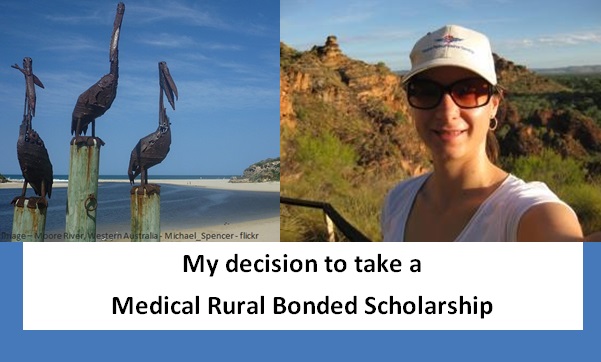
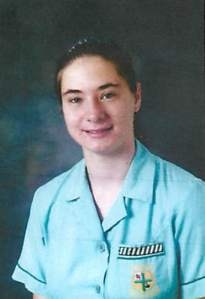
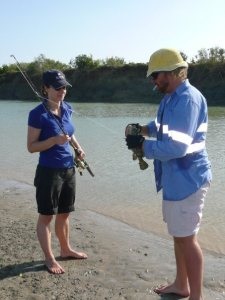
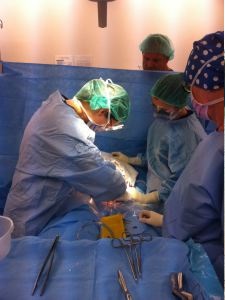
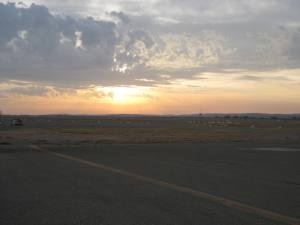
13 replies to “My decision to take a Medical Rural Bonded Scholarship (MRBS)”
Firstly, I enjoyed reading your story – you seem to have a knack for both medicine and writing!
Secondly, I am currently completing my bachelor of medical science in QLD and at the end of next year I will be given the opportunity to elect for MRBS. Working rural is something I have always wanted to do and, although the lock-in period is really daunting, I’m hoping the experience (and scholarship payments) will make it worth the while.
My main concern is the lack of info about what undertaking MRBS is like (apart from your story and the very wordy MRBS scheme contract). I was hoping you’d be able to answer some of my questions.
1. I take it you specialised in obstetrics – was this what you wanted to do? Or was that what was needed in the particular region you were bonded in.
2. How did you go about finding a hospital to work at? In other words, did you specialise and then find rural hospitals requiring that specialty? If so, how did you know which hospitals were in demand for certain professions? This is something I am struggling to find information on, because I want to work in a particular region but don’t know if I would be eligible/required.
3. Like you, my family is not in a position to support me financially and this is part of the incentive for applying for the MRBS. However, I am also passionate about contributing to the rural demand for medical professionals. Keeping in mind that I am currently aware of the commitment required for MRBS (but also that I am an idealistic 18 year old!) – would you strongly recommend I reconsider/pursue the MRBS pathway?
Once again thank you for sharing your story and I sincerely hope you achieve everything you hope to do!
Hi Blake,
Firstly – congratulations on entering medicine. It is a truly amazing career with many rewards (and challenges!) and I feel both very lucky and very privileged to be able to do it.
Great questions.
Yes – choice of specialty is something to consider when weighing up the pros and cons of MRBS.
Let me give you a quick run down of medical training as it can be confusing if you’re not in the system:
1. Primary medical degree – 4 – 6 years
2. Internship – 1 year
3. Residency – variable, usually 1-3 years. (This is the time when you work as a junior doctor in the hospital or community setting to gain skills and experience but before you enter into a specialty training program)
4. Training program – 3-6 years (This is when you have entered into training with a specialist college in order to become a “fellow” of that college, eg – GP, surgeon, physician, pathologist, obstetrician/gynae, etc etc)
Under the terms of the MRBS you can chose to specialise in which ever area you want. Two things to consider are (a) the length of the training program and (b) the demand for your chosen specialty in rural areas. You have a limited number of years after commencing your medical degree before you need to start fulfilling your return of service obligations (from memory I think it’s about 17). So, if you’re going to do a 6 year medical degree, then 4 years of internship / residency, then a 6 year training program you are going to be cutting it quite fine, particularly as it is becoming harder and harder to get into specialty training programs and so sometimes it takes an extra 2 or 3 years in to actually start the training.
I am a “GP obstetrician” which means that I did 3 years of GP training to become a Fellow of the RACGP (college of GP) and also a 12 month advanced diploma with the RANZCOG (college of O&G). I always loved both GP and obstetrics when I was going through medical school and junior doctor years. For me, I felt that the shorter training requirement of GP obstetrics (4 years) as opposed to specialty O&G training (7 years at least) made it the right choice for me, and I also prefer the variety of work that it gives me.
Once you have your fellowship, you can work anywhere in Australia in Remote areas (RA) 2-5. So, you are not bonded to a particular region. Certain specialties are in higher demand than others, and this may influence your choice of specialty training program. For example, GPs are the cornerstone of rural medicine and are in demand everywhere, and likely will continue to be in high demand. Note that as a GP it is possible to work in a variety of areas and to gain extra skills eg emergency, aboriginal health, obstetrics, anaesthetics, medical education etc etc.
On the other hand, I have a friend who is a MRBS student and really loves gynaecological oncology which is a very sub-specialised area with only a handful of people working in that field in major cities. It would be near impossible to work as a gynae onc in a rural area! However, she might chose to do general o&g training, go into a rural area to complete her rural bond years and then come back to the city for extra subspecialty training later.
Essentially, rural areas need generalists much more than sub-specialists. Eg- GPs, emergency docs, general physicians, general surgeons, general O&Gs, general paediatricians.
It’s absolutely fantastic that you have a passion for rural medicine. I do too! It’s quite likely that for people like yourself the MRBS will work out to be a great thing. However – I urge you to carefully consider how it might affect various aspects of your life. What if you really want to become a subspecialist? What if you really want to stay in the city to be close to friends and family? What if your future wife / husband can’t go to the country because of their job? What if you want to start your own practice in the city?
It is a lot of money for a young person like yourself, and it really is very handy to help you get through med school, so it’s a very difficult decision. If you decide not to go ahead with it and have to work to support yourself through med school, you will manage. It will be harder and busier but lots of people do it and they do just fine. If you do decide to take up the MRBS then I wish you well and am sure that you will find rural medicine a very rewarding career.
You might like to check out my other blog posts at nomadicgp.wordpress.com as I write a lot about my experiences of starting out as a rural doctor. Also – are you on twitter? You can follow me @nomadicgp and I can certainly put you in touch with other passionate rural doctors.
Penny
Thank you to Blake for some great questions and to Penny for answering with such detail.
Amanda – Founder My Health Career. :-)
Thanks for a very helpful guide to the realities of accepting an MRBS. It may interest people to know that the Federal Govt has declined to continue funding new MRBS contracts from 2014, pending a review.
I was offered a MRBS place in the 2014 intake for the MBBS. The offer was made in September 2013. However I have now been advised by the university that the govt has not confirmed it will actually fund the scholarship attached to the offer (although a CSP place was guaranteed), and is conducting a review. This is quite a big deal for me, as the scholarship made the financial difference in being able to study, as I expect it has to many of the other 99 prospective recipients of the MRBS in 2014. I had also adjusted my financial, living and employment affairs on the understanding I would obtain the MRBS as offered.
I suppose the AMSA and AMA will be happy to see the end of the scheme, but I feel much aggrieved.
Hi Penny,
Firstly, I just wanted to start this message by letting you know how grateful I am for you to have written this blog. Supplementing this, I wanted to commend you on your writing style — not only informative, but a great read!
I’m a second year student who currently holds an MRBS position in NSW. Like Blake (who asked some really pertinent questions, so thank you; thanks also to you, Penny, for answering them!), my family didn’t have the finances to put me through medical school, so the monetary aspect of the scholarship was a huge incentive for me to accept as a 20-year-old McDonald’s employee. More importantly though, I feel, is that I have lived in an RA2 area my whole life, so rural health has always been a ubiquitous passion of mine.
I was just wondering whether there were any institutions or any persons through your experiences who helped you to solidify a course of action in order to become a rural health practitioner, and whether they helped you to come to terms with the reality of it all before finishing medical school? I applied for the John Flynn Program last year, but wasn’t selected in the final round of cuts, but am reapplying this year, and also applying for a rural mentor program. If unsuccessful for both, do you have any recommendations of what to pursue–while studying–that could help me come to terms with the reality of rural health? You mentioned conferences for bonded students – would you recommend them, and are they particularly relevant to rural practice? I feel as though I’m going to be totally inundated with expectations and assumed knowledge/skills when I begin my rural practice, much like yourself from what I can gather, haha :/
Also, I’ve become increasingly interested in the field of sexual health (after having volunteered with an organisation called ACON since 2012), and was wondering whether that would be considered too niche of a specialty in a rural area, and whether I should look into specialising as a GP focusing on sexual health? Actually, it’s way too early to think of specialising. I understand that GP’s are in high demand though, so should I look into becoming a GP who then specialises in a sub-specialty, and pursue that sub-specialty when I have more options available to me?
Thanks again for your story, Penny – I really hope you can find contentment within the last few years of your MRBS commitment :)
Hi Penny.
I’ve only just stumbled upon your blog today after doing a search to see if anyone had experience in doing clinical work in a metro public hospital as a salaried position without breaking the rules in addition to rural work.
I’m a current MRB scholar in the 2002 cohort. I’ve decided to try and be a medical specialist with this scholarship. I’m currently finishing my Respiratory and Sleep Medicine physician training (FRACP) and will be a consultant from 2015. I didn’t realize 2001 was the first cohort. I suspect I must be one of the first specialists with this scholarship as I essentially rushed to get through all the training and exams first time. Although, I thought I may have read that there was a scholar trying to do ICU with this scholarship but can’t seem to find that forum post.
The next 6 months will be interesting for me as I try and figure out how to establish myself to meet the rural commitments. The options for specialists in my field appear to be mostly private work. I’m trying my best to go with a private company that already has some infrastructure in place (like lung function, sleep studies etc) as the thought of going out there as a first year consultant trying to set up a new service is very daunting.
I agree with everything that you’ve written in your post. In terms of my own situation, I signed up more because our family really needed the money so we could keep the house after my parent’s divorce. At the time, I had zero interest in rural medicine. As it turns out, I’ve since leveraged the “rural interest” in subsequent interviews for specialist training programs, which has turned out quite well for me and differentiated me from other candidates, esp given my CV isn’t that great. As you mentioned, there is zero support for scholars once you’re at the pointy end of the contract needing to figure out how to fulfil your commitments. You could argue that this is when scholars actually need the most support, not during your med student/intern/RMO days, which is completely different to when you about to obtain your fellowship. I should write a guide on my experiences in 6 months time to illustrate how a specialist can make the scholarship work.
Have you heard from any other scholars who have not gone down the GP pathway? As a side note, I tried to convince the Department of Health that conducting telehealth sessions would be beneficial and be allowed but that was denied.
A year has now passed since your blog, how is the experience going now?
Hi
I have started my MRBS in 2003, will became a specialist in early 2016, I haven’t signed my deed of variation which gives you scaling which is great but also closes loopholes that in the early years of the MRBS were available,.youre bound to the original contract and the attachment B with all the towns and cities in your case RRMA2-7 . So if you’re on the old contract the( Dep of Health)cannot Denny you working in those areas that now would be out of reach as long as you didn’t signed the deed of variation.
Hi,
I am currently year 12 school-leaver and got Atar 99.70, am considering to put UQ Doctor of Medicine(MD) Provisional Entry for school-leaver(Bonded Place) into my preference. I wonder if commitments of Bonded Place is similar to MRBS e.g return to service period(years) ? Hung
Congratulations on your ATAR!
Just checking that you saw our more recent article about the BMPS and the MRBS: https://www.myhealthcareer.com.au/medicine/bmps-mrbs-2015
Also, you can contact the Department of Health for more information: http://www.health.gov.au/internet/main/publishing.nsf/Content/work-st-bmp-cont
Hi Penny,
This was a great read for me- I too am an MRB scholar. I started post-grad med in 2002, and fellowed last year in ACRRM and RACGP (yes I know, doing both was craziness). My MRB experience was very similar to yours (lots of my med school classmates assuming that we our place in med was linked to our scholarship and that we had sold our souls) but I did have a couple of advantages. I was born and raised rural/remote, so never wanted to do anything else: this in itself carried a bit of stigma at uni! I think being post-grad was also advantageous; I had already ‘lived’ a bit in my first degree (ag science!) and I felt for me there were very few disadvantages to signing up.
At the other end, now married to a farmer cum diesel fitting miner, with one child, it is a little more daunting, because ‘later on’ is here and it means I need to keep working through that six years. But I was very comfortable through uni, and yes, I’d do it again.
Do you want a job? I have one of the best in the country I reckon. I work in Nhulunbuy, North-East Arnhemland. We have a small hospital where we deliver about 200 babies a year and look after….well, everything. This week alone we’ve had a 31 week HELLP syndrome, a compartment syndrome, a few bronchy babies, couple of sepsises (is that sepsi??), a varicella pneumonitis and I’ve just come home from a cord prolapse. I am one of three and a bit GP anaesthetists here, and there are three GP obstetricians. As in all rural places, we have a pretty high turnover (this is my fifth year) and we are desperately trying to recruit another GP Obs. Traditionally here the GP obs don’t cover much ED, unless we get short, so you won’t spend much time lying STEMIs… And it is a wonderful, well-serviced town (especially for kids if you have any). The fishing shits on the Pilbara, to put it bluntly….!
If I sound desperate, we are a bit! Anyway, great article- thanks! I’m sure one day we’ll cross paths somewhere!
Cheers
Greer
Hi Penny,
I too am a first cohort MRBS doctor – now a FANZCA (an Anaesthetist). Your comments about the MRBS scheme echo my thoughts exactly. I could not have predicted all those years ago when I signed on (and I too achieved a place in Medical school without the necessity of the Bond) that I would have two young children and an ex wife living overseas and that I obviously would much prefer to be where my kids are than in some remote area of Australia. I am currently looking for ways to make it so I can complete the return of service and maintain a decent connection with my kids… if it comes down to it, given the harshness of the requirements for return of service and my difficult personal position I may simply pull out, replay the money and perhaps talk to a solicitor about the employment restrictions they could impose. After all, if it is impossible to fulfil the obligation they at least need to leave you with the ability to work and so repay the debt.
Your comments about the stigma and the lack of support for senior graduates are also exactly how I feel. I feel I was tricked at a vulnerable point in my life into taking the scholarship, a decision I regret now.
Thanks
Joel
Hi Joel,
Sorry to hear about your difficult situation. You were probably interested to hear that the Department of Health is no longer taking new entrants into the MRBS: http://www.health.gov.au/mrbscholarships
Best wishes,
Amanda – founder MHC.
Hi All,
I came across this post when I was searching for up-to-date information on the MRBS return of service requirements. There are all sorts of rumours going around – they only attend the office for phone calls for 2 hours a day (this is true), they have forgotten about us (I haven’t had any communciation from them in years).
I am a bonded scholar and will attain FRANZCP next year. I also decided to take the scholarship as a 17 year-old who grew up in Sydney and the money was a big drawcard. I then went on to have some fantastic training experiences in rural and remote areas, although have all of my psychiatry training to date in the city. I know of one other psych reg who has the scholarship and was lucky enough to marry a man from a regional town where she can work. Are there any other psychiatrists / psychiatry trainees out there who have MRBS?